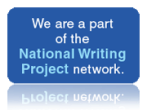Serve Your Enthusiasm
By Bob Zakrzewski
Often this time of year when winter overstays its welcome, I find solace in the sun stretching each day longer, melting January and February’s icy blues and chapped pinks into March greens. And as a high school English teacher on a block schedule, facing mid-winter accompanies meeting new students, reminding me of James Baldwin’s apt observation: “Fires can’t be made with dead embers, nor can enthusiasm be stirred by spiritless men.”
Enthusiasm fuels my teaching. Years spent honing the art of organizing lessons and developing an understanding of writing, although well-spent, could not sustain me. Walking into class with a well-prepared plan and confident knowledge of the day’s literature felt great, yet, lacking enthusiasm, the lessons fell flat.
But awareness does not equal action, and acknowledging enthusiasm’s importance did not suddenly make me comfortable showing it. Evolving from “divinely inspired fervor” (via Greek en/in + theos/god), the word evokes otherworldly energy I considered beyond my grasp (No, Dead Poets Society did not inspire my career choice). More comfortable deflecting blame, I complained, “Aren’t the students here to benefit from my knowledge? Shouldn’t my expertise be enough to motivate them?” This mentality bred frustration, and my teaching career would not have lasted long without changing it.
Most literature I teach, and perhaps the purpose of literature itself, promotes considering other perspectives, yet I did not. After much trial and error addressing this problem, my self-centered approach gave way to embracing classroom diversity. I found each student could, regardless of ability or interest, engage more comfortably with literature if I acted as content facilitator rather than knowledge dictator. And fortunately, I enjoyed showing enthusiasm for their learning far more than showing it for how much I already knew.
A colleague and I recently discussed teaching challenging literature, and she mentioned relying on how all reading and writing provides opportunities for personal and social exploration, which can appeal to anyone in some way. The trick is finding this “way”, and an effective English classroom creates a space for this exploration. My enthusiasm ignites student willingness to, as I call it, “play school” and see where the journey goes. This exploration can produce anxiety and discomfort, but genuinely listening to student reactions while sincerely sharing mine forges a trusting environment where all can consider our barriers and how to approach them. And once this personal investment is made, active reading and thoughtful writing soon follow.
Today my classroom is a paradox of individualized itineraries on a group tour. I am the tour guide, yet my world changes with each excursion, influenced by the varying perspectives every traveler brings. Returning to James Baldwin, he added, “Enthusiasm in our daily work lightens effort and turns even labor into pleasant tasks.” My pleasant task involves helping students board the “English Class” vessel and travel out of frigid winter to the warm climes of June, anticipating our destination, but more enthused by what the journey teaches along the way.
 Bob Zakrzewski is a 2009 PAWLP Fellow. Teacher since 1999, he currently teaches English at Strath Haven High School and Cabrini College.
Bob Zakrzewski is a 2009 PAWLP Fellow. Teacher since 1999, he currently teaches English at Strath Haven High School and Cabrini College.




Trackbacks & Pingbacks